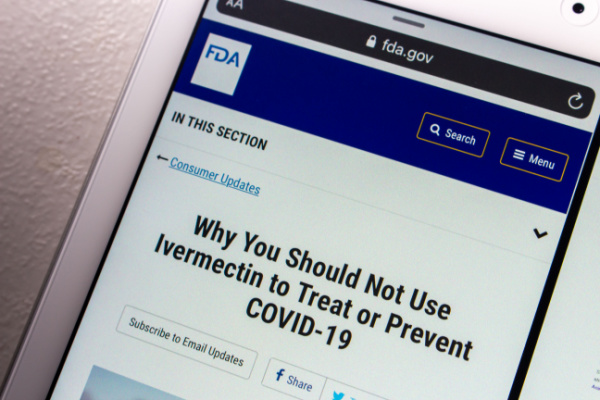In 2021, a bizarre cure for COVID-19 began to emerge on social media, the anti-parasite drug ivermectin. The Food and Drug Administration (FDA) is now under fire for its efforts to refute claims that the drugs could stop the deadly virus.
A group of doctors is now suing the FDA, saying the agency’s efforts to refute claims about the drug’s effectiveness against COVID caused them personal harm. Some experts fear that punishment the FDA could face for refuting false information about the drug could undermine public health messaging in America.
After a questionable, and later-retracted, study claiming ivermectin could cure COVID emerged in 2021, many Americans began to seek it out. It became especially popular among people in communities that were skeptical of the COVID-19 vaccines and other pandemic measures such as masking and social distancing.
Originally introduced as a veterinary drug in the 1970’s, it kills a wide range of internal and external parasites in commercial livestock and companion animals. For humans, the drug’s purpose is to treat a variety of internal nematode and parasitic infections, and has been widely hailed for fighting disfiguring and devastating diseases Onchocerciasis and Lymphatic filariasis, which blight the lives of billions of the poor and disadvantaged throughout the tropics.
However, Ivermectin is an FDA-approved drug, meaning doctors are allowed to prescribe it as they see fit, and during the COVID-19 pandemic, some doctors began to prescribe it off-label for COVID. The drug has never been proven to be effective against COVID, and multiple studies investigating its efficacy have found it to be completely ineffective at preventing or treating the virus.
Some anecdotal reports emerged that people were circumventing physicians entirely, seeking out veterinary versions of the drug, meant for horses or cows, to use to fight infections. A now-infamous Tweet from the FDA responding to these stories is now at the center of the current lawsuit. “You are not a horse. You are not a cow. Seriously, y’all. Stop it,” the FDA wrote on the platform now known as X.
Three doctors are plaintiffs in the lawsuit, first filed in September. Robert Apter, M.D., an Arizona physician; Paul Marik, M.D., a doctor at Eastern Virginia Medical School; and Mary Talley Bowden, M.D., a Texas doctor who made national headlines when she was suspended by Houston Methodist Hospital for allegedly spreading vaccine misinformation.
“FDA decided to target that practice via the ‘horse’ message—and others like it. The messaging traveled widely across legacy and online media,” they write in their suit. “Left unmentioned in most of the messaging: ivermectin also comes in a human version. And while the human version of ivermectin is not FDA-approved to treat the coronavirus, some people were using it off-label for that purpose.” The plaintiffs say they prescribed the medication off-label to “thousands of their patients”. They claim the FDA’s attempts to debunk the ivermectin myth “interfered with their own individual medical practice”.
The FDA moved to dismiss the lawsuit, which was granted by a District Court in Texas. However, a Fifth Circuit revived the case after an appeal. This means the FDA could face punishment for its statements on ivermectin, and reduce the agency’s freedoms when discussing public health topics. Christopher Robertson, J.D., Ph.D. and Tina Watson, legal experts from Boston University, write in the New England Journal of Medicine that “If the case against the FDA ultimately prevails, the agency’s ability to protect the public and support evidence-based medicine could be eroded.”
They describe the Fifth Circuit’s decision as “puzzling”. Judges in the case write that the FDA does not have the authority to endorse, denounce or advise on medical decisions — just the power to inform or announce. “The agency routinely releases consumer-directed information; for example, its website instructs consumers about the appropriate use of antibiotics and includes related clinical information,” the Boston experts write. “The opinion suggests the FDA may need to reevaluate each of these communications — an impractical proposition.
“The Fifth Circuit is now suggesting that the FDA cannot insert its views into this free market of ideas, even if its speech is truthful and could be helpful to the public,” they continue. “…Meanwhile, “junk science” pervades social media and harms public health.”
—
Photo Credit: Koshiro K / Shutterstock.com
